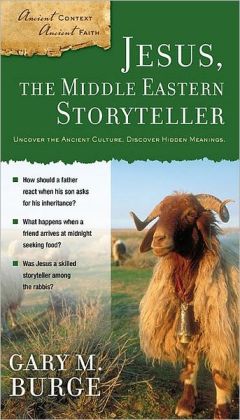Jesus, the Middle Eastern Storyteller, by Gary M. Burge

Genre: Ancient History / Bible Studies
Reason for reading: This year, I'm studying Jesus and the New Testament. This book was loaned to me by Elizabeth, a friend from work. It was given to her by a friend because the author was her professor.
Synopsis: In this short book, Burge guides the reader to interpret Jesus as a storyteller - a teacher who uses allegory and hyperbole to make important points within his own social context. The book is filled with beautiful pictures and several examples of Jesus' use of hyperbole to teach an important point. Burge provides historical and cultural insight into what Jesus may have been talking about when telling his parables.
My thoughts: I was surprised at how fun this book was. Although it's quite short, and half of it was pictures, it made me look at Jesus from a interesting new perspective. Of course, I already knew that Jesus used parables and hyperbole to make points, but it was really interesting to read Burge's cultural analysis of those parables.
The story I found most enlightening was Burge's interpretation of the fig tree incident. For those of you who don't recall, the story is related in Mark 11:12-14, 11:20-25; and in Matthew 21:18-22. In my unromantic version, Jesus is hungry, and he sees a fig tree by the road. It's not fig season, so the tree isn't bearing any fruit. Jesus curses the poor tree and it withers. I've always disliked that story. Despite my cousin Steve's insistence that fig trees don't have feelings, and I shouldn't take the story so literally, I always felt sorry for the tree. Why'd Jesus curse a tree just because it wasn't bearing fruit in the off-season? (And, yes, Mark clearly states that it wasn't the season for figs.)
Burge pointed out that the fig tree represented the Jewish state and religion. Throughout the New Testament Jesus repeatedly pointed out the hypocrisy of the Pharisees, who made a public spectacle of themselves fasting, praying, and giving alms; but who did not keep the spirit of religion in their hearts. They prayed for the approval of the people, not for the approval of God. Thus, they were not "bearing fruit."
Of course, I realize that this insight about the fig tree and the Pharisees is not uniquely Burge's - in fact I found some interesting articles on the subject after reading Burge's book (here's a good one). What's important is that Jesus, the Middle Eastern Storyteller introduced me to some interesting interpretations that I could look into in more detail later. In that way, this book was a valuable resource for me.

I always did wonder about the Fig Tree story myself. I never delved into it, as I have tended to do with other things that I wonder about. Burge's interpretation makes sense.
ReplyDelete